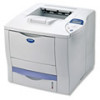Brother International HL-7050N Users Manual - English - Page 207
If you print on thick paper that weighs more than 150 g/m
 |
UPC - 012502603375
View all Brother International HL-7050N manuals
Add to My Manuals
Save this manual to your list of manuals |
Page 207 highlights
You must use the face-up output tray for certain print media. When looking at this page on the CD-ROM, you can jump to the page for each printing method by clicking the i in the table. Media type Plain paper Recycled paper Bond paper Thick paper Thicker paper Transparency Labels Envelope Card stock Thin paper Face-down i i i i i i i Face-up i i i i i i i i i i Notes 60 g/m2 to 105 g/m2 (16 to 28 lb) 105 g/m2 to 150 g/m2 (28 to 40 lb) 150 g/m2 to 200 g/m2 (40 to 53 lb) Overhead projector film You can use the control panel Menu buttons to select the priority of the paper source in the PAPER menu. For more information about this setting, see Chapter 3. ■ If you print on thick paper that weighs more than 150 g/m2 (40 lb), use face-up printing. ■ We recommend that you use face-up printing when you print on transparencies. ■ If the paper is misfeeding or a lot of pages go through at the same time when you print on small or thick paper, change the paper thickness switches on the bottom of the paper tray. For more information, see page 1-22. A - 8















